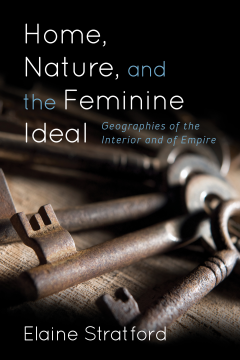
Additional Information
Book Details
Abstract
Take three things: the home, nature, and the feminine ideal—a notional and perfected femininity. Constitute them as inexorably and universally connected. Enrol them in diverse strategies and tactics that create varied anatomo-politics of the body and biopolitics of the population. Enlist those three things as the “handmaidens” of the government of individuals and groups, places and spaces, and comings and goings. Focus some effort on the periodical press, and on producing and disseminating narratives, discourses, and practices that relate specifically to health and well-being. Deploy those texts and shape those contexts in ways that affect flesh and bone, psychology and social conduct, and the spatial organization and relational dynamics of dwellings and streets, settlements and regions, and states and empires. Stretch these activities over the Anglophone world—from the epicentres of the United Kingdom and the United States to Australia or Canada, New Zealand or India—and extend their reach over the whole of the long nineteenth century. Such are the subjects of this work, in which Elaine Stratford draws from governmentality, the geohumanities, and geocriticism to converse with an extensive archive that profoundly shaped our engagements with home, nature, and the feminine ideal, deeply influenced our collective capacity to flourish, and powerfully constituted diverse geographies of the interior and of empire that still affect us.
A major work on the biopolitical shaping of femininity in the Anglophone world in the 19th Century – and indeed into the 21st Century. Elaine Stratford shows how women were conditioned to be dutiful wives and daughters whose domestic roles were to promote morality, hygiene and a healthy, disciplined population. This volume joins the scholarly pantheon, led by Dolores Hayden and Christine Boyer, who centre women's bodies in geography and planning research.
Jean Hillier, Emeritus Professor of Sustainability and Urban Planning, RMIT University
‘‘Cleanliness is next to godliness’; ‘the hand that rocks the cradle rules the world’. In nineteenth century Anglophone nations, women’s lives were understood in terms of such mantras. Their faces, fashions and domestic environments were part of their responsibility for the morality and health of their families, homes, and even the perceived decline of the population. Stratford’s lively, wide-ranging and yet penetrating analysis of nineteenth century texts shows how women’s bodies were governed in the interests of improvement.
Ruth Fincher, Redmond Barry Distinguished Professor Emeritus, School of Geography, University of Melbourne
Professor Elaine Stratford is a member of the Institute for the Study of Social Change at the University of Tasmania. Elaine is also the is the lead editor of Rowman & Littlefield International’s series Rethinking the Island and, with Philip Steinberg and Kimberley Peters, is an editor of and contributor to Territory Beyond Terra, another Rowman & Littlefield International title.
In Home, Nature, and the Feminine Ideal Elaine Stratford presents a lucid and eloquently written account of the ways in which bodies shape, and are shaped by, geographies of the interior and empire. This powerful book beautifully illustrates the connections between feminine embodiment, home, and nature in the Anglophone world during the long nineteenth century. With compelling attention to periodical press as well as other formal and populist texts (a collaboration with the archive), Stratford charts the mechanisms of life and place. She explores national and imperial ambitions as they are entangled and folded through bodies, home, nature, communities, settlements, regions, colonies and territories. The book reveals deep insights into intricate biopolitical assemblages of gender, race, and class. Empirical gems - beauty; health; fashion; moral and social progress; scientific motherhood, domestic economy, public health and bad smells – cause the reader to pause, reflect and rethink notions of progress and reform. This stunning book will be an invaluable resource across the social sciences and humanities.
Lynda Johnston, Professor of Geography, University of Waikato
Table of Contents
| Section Title | Page | Action | Price |
|---|---|---|---|
| Cover | Cover | ||
| Half Title | i | ||
| Title Page | iii | ||
| Copyright Page | iv | ||
| Dedication | v | ||
| Contents | vii | ||
| Acknowledgements | ix | ||
| Introduction | 1 | ||
| 1 ‘Her first duty’—beauty, morality, and the gilded cage | 25 | ||
| 2 ‘To maintain vigour’—population, fitness, and race | 51 | ||
| 3 ‘The song of the skirt’—raw nature and fashionable conduct | 81 | ||
| 4 ‘Good breeding’—combatting the decline of the population | 119 | ||
| 5 ‘The hand that rocks the cradle’—scientific mothers and strong babies | 151 | ||
| 6 ‘Cleanliness is next to godliness’—health, habit, and domestic economy | 183 | ||
| 7 ‘We do hereby authorise and require’—contagion, public health, and a return to home | 217 | ||
| Synthesis | 251 | ||
| Bibliography | 265 | ||
| Index | 307 |
